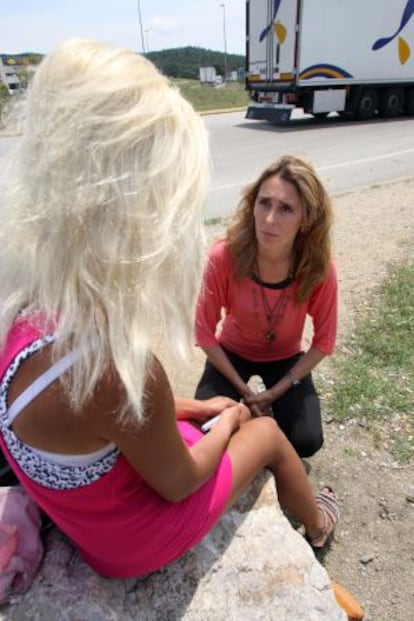La Jonquera: A supermarket for sex
The mayor of the Girona border town is fighting a losing battle against prostitution Municipalities are seeking out creative methods to curb the selling of sex on their streets

A five-minute drive through La Jonquera, in Girona province, is all it takes to understand the mayor's frustration over prostitution here. There are semi-naked women everywhere - under the bridges, on traffic circles, in parking lots - all trying to attract the attention of drivers. They can make up to 300 euros a day, or nothing at all. They are there every day, rain or shine. Once, this border town of 3,000 residents was also something of a shopping destination for the French. Now, it is a supermarket for sex.
Much to its residents' dismay, La Jonquera has become famous for its prostitution. Competition is fierce: there are the roadside prostitutes, and there are those who work inside a giant brothel called Paradise, whose owner has been convicted to three years in jail for illegally bringing women in from Brazil for prostitution.
Prostitution itself is neither legal nor illegal in Spain - there is no specific legislation on the issue, a fact that has forced several municipalities to seek out creative methods to curb the selling of sex on their streets, such as harassing potential clients by getting the police to ask for their IDs.
Two women are spearheading La Jonquera's own fight against prostitution: Mayor Sonia Martínez and police chief Lluisa Santos.
There are French clients who drive several hours to come here!"
A little over a week ago, two young women from Romania were stood on a roundabout, trying to attract drivers. The mayor walked over to them; one left immediately, while the other started crying when she saw the photographer. "My family does not know what I'm doing here!" she sobbed.
"Do you know that your work is dangerous and that we at city council can help you?" asked Martínez.
"I have a friend; she helps me when there's trouble," replied Silutza, 25, who denied she was being forced to sell her body. "I do it because I want to."
But her cellphone did not stop ringing while the mayor talked to her. The calls were from a man sitting outside a nearby bar. "He is my friend," said Silutza.
How can you give someone facing charges a license to open a brothel?"
"That's where they keep an eye on them," explains Mayor Martínez. "They spend all day at the bar, playing the slot machines."
Silutza's skin is sunburnt. She and her fellow sex worker place their handbags on top of a stone. Their behinds are bare, and the few items of clothing on their bodies are garish and cheap-looking. They say they work around eight hours a day, from noon to 8pm. "I am free and I can leave whenever I want to," says Silutza defiantly, before cutting the conversation short.
"It's always the same thing," sighs Martínez. "They won't let anyone help them."
The mayor explains that for several years now, there have been growing numbers of prostitutes on the roads of La Jonquera. In 2010, the Paradise opened here with 90 rooms.
"There are French clients who drive several hours to come here! Many of them are youngsters aged between 18 and 20, who should not have problems finding sexual partners," she says. "Over in France they're very worried about this trend."
The town opposed the brothel, whose owner was already facing charges in two separate legal investigations when he requested the license. Local authorities turned down the request, but the Catalonia Superior Court of Justice forced them to award it.
"How can you give someone who is facing charges a license to open a brothel?" asks Martínez. "I think each municipality should be able to decide that, and we didn't want the Paradise here."
Contrary to claims that the brothel brings in much-needed revenue to the village, the mayor says the club pays no more taxes than any other establishment.
"It's true that the prostitutes use our hair and beauty salons, but that's not what La Jonquera's economy is based on. It's not even true that they buy their prophylactics at the local pharmacy," says the mayor.
Local authorities have counted several dozen prostitutes on the town's roads. Most are Romanian, said the mayor, but there were also four Bulgarians, three Senegalese and five Nigerians. "All of them said they do it of their free will, and some also work as home cleaners or caregivers," says the mayor.
Tu suscripción se está usando en otro dispositivo
¿Quieres añadir otro usuario a tu suscripción?
Si continúas leyendo en este dispositivo, no se podrá leer en el otro.
FlechaTu suscripción se está usando en otro dispositivo y solo puedes acceder a EL PAÍS desde un dispositivo a la vez.
Si quieres compartir tu cuenta, cambia tu suscripción a la modalidad Premium, así podrás añadir otro usuario. Cada uno accederá con su propia cuenta de email, lo que os permitirá personalizar vuestra experiencia en EL PAÍS.
¿Tienes una suscripción de empresa? Accede aquí para contratar más cuentas.
En el caso de no saber quién está usando tu cuenta, te recomendamos cambiar tu contraseña aquí.
Si decides continuar compartiendo tu cuenta, este mensaje se mostrará en tu dispositivo y en el de la otra persona que está usando tu cuenta de forma indefinida, afectando a tu experiencia de lectura. Puedes consultar aquí los términos y condiciones de la suscripción digital.








































